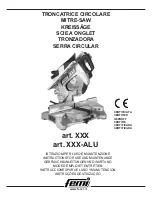
7
Selecting the cutting action
Fig.3
This tool can be operated with an orbital or a straight
line (up and down) cutting action. The orbital cutting
action thrusts the blade forward on the cutting stroke
and greatly increases cutting speed.
To change the cutting action, just turn the cutting action
changing lever to the desired cutting action position.
Refer to the table to select the appropriate cutting action.
Position
Cutting action
Applications
For cutting mild steel,
stainless steel and plastics.
For clean cuts in wood
and plywood.
Small orbit
cutting action
For cutting mild steel,
aluminum and hard wood.
For cutting wood and
plywood.
For fast cutting in
aluminum and mild steel.
Large orbit
cutting action
For fast cutting in
wood and plywood.
0
Straight line
cutting action
Medium orbit
cutting action
006376
Switch action
CAUTION:
•
Before inserting the battery cartridge into the tool,
always check to see that the switch trigger
actuates properly and returns to the "OFF"
position when released.
Fig.4
To start the tool:
Press the lock switch to turn the tool into standby mode.
It turns the lamp on, too.
Pull the switch trigger to start the tool. Release the
switch trigger to stop.
For continuous operation, pull the switch trigger and
then push in the lock on button.
To stop the tool from the locked position, pull the switch
trigger fully, and then release it.
In standby mode, press the lock switch to turn the lamp
off and turn the tool into lock-off mode.
NOTE:
•
The lock switch does not actuate during cutting
operation.
•
When the tool is in standby mode, the lamp keeps
lighting.
•
If the tool is left 10 seconds without any operations
in standby mode, the tool is automatically turned
into lock-off mode and the lamp goes off.
Lighting up the lamps
CAUTION:
•
Do not look in the lamp or see the source of lamp
directly.
To turn on the lamp, press the lock switch.
To turn off the lamp within 10 seconds, press the lock
switch again.
NOTE:
•
Use a dry cloth to wipe the dirt off the lens of lamp.
Be careful not to scratch the lens of lamp, or it
may lower the illumination.
•
When the tool is overheated, the lamp flickers.
Cool down the tool fully before operating again.
Speed adjusting dial
Fig.5
The tool speed can be infinitely adjusted by turning the
speed adjusting dial. You can get the highest speed at 6
and the lowest speed at 1.
Refer to the table to select the proper speed for the
workpiece to be cut. However, the appropriate speed
may differ with the type or thickness of the workpiece. In
general, higher speeds will allow you to cut workpieces
faster but the service life of the blade will be reduced.
Number on adjusting dial
4 - 6
Mild steel
3 - 6
Stainless steel
3 - 4
Aluminum
3 - 6
Plastics
1 - 4
Workpiece to be cut
Wood
013925
CAUTION:
•
The speed adjusting dial can be turned only as far
as 6 and back to 1. Do not force it past 6 or 1, or
the speed adjusting function may no longer work.
NOTE:
•
When the speed adjusting dial is at 3 or higher, the
tool automatically reduces the no-load speed to
reduce the vibration under no-load. Once the tool
gets load, the tool speed reaches the preset speed.
Then the tool keeps the speed until the tool is
switched off. When temperature is low and there is
less fluidity in grease, the tool may not have this
function even with the motor rotating.
ASSEMBLY
CAUTION:
•
Always be sure that the tool is switched off and the
battery cartridge is removed before carrying out
any work on the tool.








































